Picture Making a Difference
Background

The idea for Resiliency Village was born in January of 2019, in response to the homeless situation in Tuolumne and Calaveras Counties. For two years prior, we worked as a component of the Jamestown Family Resource Center, under the title of the Community Solutions Group. Our aim was for a quick response, addressing needs that were pertinent for the health and welfare of our homeless friends and neighbors. The Community Solutions Group fostered the Stuff the Bus for the Homeless Project, collecting blankets, tents, tarps, clothing, and other necessary items to help people through the bitter cold winter months. The process was hand-to-hand. We collected donated items on the bus and took them directly to the camps. There was no middle-man or lag time. Community Solutions Group also purchased dumpsters to help clean up the camps located on Stockton Road in Sonora. We rented two dumpsters, and one was donated.
Other efforts during this time included participating in the semi-annual ATTCA PIT (point-in-time) count, attending City Council and Homeless Task Force Meetings, and providing food, clothing and other items through the Jamestown Family Resource Center. In these past few years, we have come to know many people who live in the camps. We have listened to their stories and responded to their concerns.
The role of trauma
In January 2019, Mark Dyken, Brenda Chapman, and Shelley Muniz met to discuss another aspect of experiences past and present with Trauma-Informed Practices. Mark Dyken has been involved in public education for many years, as part of the Special Friends program, a director for the Blue Mountain Coalition for Youth and Family in West Point, CA, as director of the Jamestown Family Resource Center, and he is currently the Foster Care Liaison for Tuolumne County. Part of his job has included Trauma Training at our county schools.
Brenda Chapman has been a school teacher, principal, and superintendent, and she believes in the importance of Trauma-informed care has been a large part of her core values and professional service to children.
Shelley Muniz was part of the Special Friends program, a teacher’s aide and librarian at Belleview Elementary School for fifteen years and has been a Library Specialist at Columbia College for fifteen years, where she has taken part in many participatory programs regarding student health and wellbeing. During her time in these positions, she has seen and felt the significance of trauma in children’s lives, and came to recognize that there was a better way of dealing with a traumatized child than the typical punishments prescribed in most school environments.
Through their combined experiences, Mark, Brenda, and Shelley contrived their plan for Resiliency Village, a comprehensive eco-village serving distressed populations of people, from children through adult, through not only traditional means but through art therapy, music therapy, drama, the written word.
The Vision statement for their project, now called Resiliency Village states:
Vision
The Foothill Communities’ disenfranchised citizens, including homeless, transitional youth, and seniors, will live in an inclusive self-governing community, which includes direct access to medical, dental, and mental health services, designed around the creative arts therapies provided through a comprehensive trauma center. Children, adults, and seniors affected by trauma, not living on the site, will benefit from comprehensive on-site counseling, art/music therapy, life skills and other services provided by the center.
Goal
To create an inclusive micro-community through community partnerships that provide services, trauma resolution, and skill building that enables citizens to become self-sustaining productive members of the community.
Mission
Resiliency Village’s mission is to improve the quality of life for our unsheltered and otherwise traumatized citizens. We provide fundamental on-site services, creative art therapies, skill-building, and the model of a healthy lifestyle, supporting the opportunity for a self-sustaining future through housing, healing, and hope.
Development
In June, 2019, Erin O’Hare (Peaceful Valley Farmers Market) and Robert Gelman (Wholelife Network, Spirit/Mind/Body Expo) joined the organizing committee (although O’Hare has since left), and in 2020 Colette Such and Joseph Mathiesen-Powell joined the group, now officially its Board of Directors.
Immediate objectives included obtaining non-profit status and property to develop the project. A bank account is in place for donations, and office space is established at our chosen location to begin actions in earnest to continue Phase 1 of Resiliency Village.
To date, we have received hundreds of responses from interested persons including doctors, nurses, counselors, therapists, and many other professional and semi-professionals. We have also received interest from the general public, offering skills such as gardening, to teach classes on crocheting, music, and art to name a few. We have also received responses from homeless and from parent’s of homeless, all appreciative and thankful for the potential effect Resiliency Village will have on our county/counties.
Impact
Resiliency Village will take a leading role in the homeless issue, trauma-training, and trauma-related issues for citizens of all ages. We include seniors in this project as well, as we see a need to provide services and housing similar to the “Tiny House” portion of our eco-community plan. We plan to partner or provide space for existing county services when applicable and have had productive meetings that could lead to a cooperative future. We want to provide a “one-stop-shop” experience, where community and non-community can receive the care, advice, and help they need.
Long-term, our plan is to have residents fully engaged in the process, the plan, and the execution of development at Resiliency Village. We feel that buy-in from our Resiliency Village community members and members of the community at large will aid in the success of this project.
